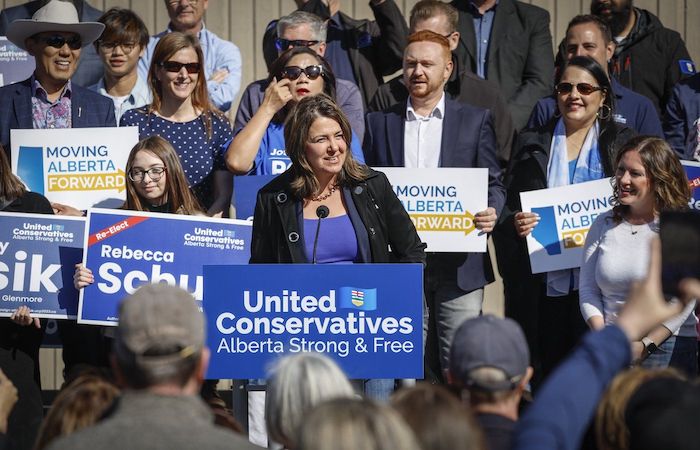Alberta
Writ drops for Alberta provincial election on May 29

United Conservative Party Leader Danielle Smith, centre, speaks at a campaign launch rally in Calgary, on Saturday, April 29, 2023. Smith is expected to call a provincial election during an announcement later this morning in Calgary. THE CANADIAN PRESS/Jeff McIntosh
Calgary
Writs issued for the 2023 Provincial General Election
Alberta’s Chief Electoral Officer, Glen Resler, confirms that Writs were issued today to administer elections across Alberta. The 31st Provincial General Election will be held on May 29, 2023.
Alberta’s Chief Electoral Officer, Glen Resler, confirms that Writs were issued today to administer elections across Alberta. The 31st Provincial General Election will be held on May 29, 2023.
“We are excited to welcome Albertans back to the polls this month,” said Resler. “Returning Officers have been appointed, and we are in the process of recruiting and training nearly 20,000 Election Officers to conduct voting in the 87 electoral divisions across the province.”
Voter Eligibility
Canadian citizens who reside in Alberta and are at least 18 years of age or older on Election Day are eligible to vote in the Provincial General Election.
Voter Registration
Electors may register to vote online at www.voterlink.ab.ca until May 17, 2023, by contacting Elections Alberta or their local returning office before 4:00 p.m. on Saturday, May 20.
Electors can also register to vote at any advance voting location in Alberta or at their assigned voting place on Election Day.
Electors who are already registered to vote at their current address do not need to register again.
Voter Identification
To vote in the 2023 Provincial General Election, electors are required to prove their identity and current address. There are several ways to do this, including:
- Providing one piece of Government-issued photo ID, including the voter’s full name, current address, and a photo.
- Providing two pieces of ID, both containing the voter’s full name and one that lists their current physical address.
- Having another registered elector with identification that resides in their voting area vouch for them.
- Having an authorized signatory complete an attestation form.
More than 50 different types of identification have been authorized by the Chief Electoral Officer to be used as identification to vote.
Key Timelines
Electors have 28 days to vote by Special Ballot beginning today. Special Ballots may be completed in the returning office, picked up by a designate of the elector, or mailed to the elector anywhere in the world. Applications can be submitted online on the Elections Alberta website.
Candidate nominations are now open and end on May 11, 2023, at 2:00 p.m.
Advance voting begins on Tuesday, May 23, 2023, and ends on Saturday, May 27, 2023.
Election Day is Monday, May 29, 2023. All voting places will be open from 9:00 a.m. to 8:00 p.m.
Unofficial results will be available after voting closes on Election Day.
Official results will be announced on June 8, 2023, at 10:00 a.m.
Returning Offices
Returning offices in all electoral divisions open today across Alberta. Returning offices are open on weekdays from 9:00 a.m. to 6:00 p.m., Saturdays from 10:00 a.m. to 4:00 p.m., and on Voting Days from 9:00 a.m. to 8:00 p.m. Returning Office addresses and contact information can be found at: https://elections.ab.ca/
New for 2023, Satellite Offices are also being opened in six geographically large electoral divisions to provide more service options for electors. These include:
- 54 – Cardston-Siksika
- 55 – Central Peace-Notley
- 59 – Drumheller-Stettler
- 60 – Fort McMurray-Lac La Biche
- 77 – Peace River
- 80 – Rimbey-Rocky Mountain House-Sundre
Satellite Offices are open on Tuesdays and Thursdays from 9:00 a.m. to 6:00 p.m., Saturdays from 10:00 a.m. to 2:00 p.m., and on Voting Days from 10:00 a.m. to 8:00 p.m.
For any questions or concerns regarding the provincial election, visit www.elections.ab.ca, call 1-877-422-VOTE, or email [email protected].
Information for media will be available throughout the election period at https://www.elections.ab.ca/
- Information sheets on topics such as Registering to Vote, Voter Identification, Accessible Voting and Tabulators and Voter Assist Terminals.
- Photo and video assets.
- Processes for accessing a voting place on voting days.
Elections Alberta is an independent, non-partisan office of the Legislative Assembly of Alberta responsible for administering provincial elections, by-elections, and referenda.
Alberta
Federal budget: It’s not easy being green

From Resource Works
Canada’s climate rethink signals shift from green idealism to pragmatic prosperity.
Bill Gates raised some eyebrows last week – and probably the blood pressure of climate activists – when he published a memo calling for a “strategic pivot” on climate change.
In his memo, the Microsoft founder, whose philanthropy and impact investments have focused heavily on fighting climate change, argues that, while global warming is still a long-term threat to humanity, it’s not the only one.
There are other, more urgent challenges, like poverty and disease, that also need attention, he argues, and that the solution to climate change is technology and innovation, not unaffordable and unachievable near-term net zero policies.
“Unfortunately, the doomsday outlook is causing much of the climate community to focus too much on near-term emissions goals, and it’s diverting resources from the most effective things we should be doing to improve life in a warming world,” he writes.
Gates’ memo is timely, given that world leaders are currently gathered in Brazil for the COP30 climate summit. Canada may not be the only country reconsidering things like energy policy and near-term net zero targets, if only because they are unrealistic and unaffordable.
It could give some cover for Canadian COP30 delegates, who will be at Brazil summit at a time when Prime Minister Mark Carney is renegotiating his predecessor’s platinum climate action plan for a silver one – a plan that contains fewer carbon taxes and more fossil fuels.
It is telling that Carney is not at COP30 this week, but rather holding a summit with Alberta Premier Danielle Smith.
The federal budget handed down last week contains kernels of the Carney government’s new Climate Competitiveness Strategy. It places greater emphasis on industrial strategy, investment, energy and resource development, including critical minerals mining and LNG.
Despite his Davos credentials, Carney is clearly alive to the fact it’s a different ballgame now. Canada cannot afford a hyper-focus on net zero and the green economy. It’s going to need some high octane fuel – oil, natural gas and mining – to prime Canada’s stuttering economic engine.
The prosperity promised from the green economy has not quite lived up to its billing, as a recent Fraser Institute study reveals.
Spending and tax incentives totaling $150 billion over a decade by Ottawa, B.C, Ontario, Alberta and Quebec created a meagre 68,000 jobs, the report found.
“It’s simply not big enough to make a huge difference to the overall performance of the economy,” said Jock Finlayson, chief economist for the Independent Contractors and Business Association and co-author of the report.
“If they want to turn around what I would describe as a moribund Canadian economy…they’re not going to be successful if they focus on these clean, green industries because they’re just not big enough.”
There are tentative moves in the federal budget and Climate Competitiveness Strategy to recalibrate Canada’s climate action policies, though the strategy is still very much in draft form.
Carney’s budget acknowledges that the world has changed, thanks to deglobalization and trade strife with the U.S.
“Industrial policy, once seen as secondary to market forces, is returning to the forefront,” the budget states.
Last week’s budget signals a shift from regulations towards more investment-based measures.
These measures aim to “catalyse” $500 billion in investment over five years through “strengthened industrial carbon pricing, a streamlined regulatory environment and aggressive tax incentives.”
There is, as-yet, no commitment to improve the investment landscape for Alberta’s oil industry with the three reforms that Alberta has called for: scrapping Bill C-69, a looming oil and gas emissions cap and a West Coast oil tanker moratorium, which is needed if Alberta is to get a new oil pipeline to the West Coast.
“I do think, if the Carney government is serious about Canada’s role, potentially, as an global energy superpower, and trying to increase our exports of all types of energy to offshore markets, they’re going to have to revisit those three policy files,” Finlayson said.
Heather Exner-Pirot, director of energy, natural resources and environment at the Macdonald-Laurier Institute, said she thinks the emissions cap at least will be scrapped.
“The markets don’t lie,” she said, pointing to a post-budget boost to major Canadian energy stocks. “The energy index got a boost. The markets liked it. I don’t think the markets think there is going to be an emissions cap.”
Some key measures in the budget for unlocking investments in energy, mining and decarbonization include:
- incentives to leverage $1 trillion in investment over the next five years in nuclear and wind power, energy storage and grid infrastructure;
- an expansion of critical minerals eligible for a 30% clean technology manufacturing investment tax credit;
- $2 billion over five years to accelerate critical mineral production;
- tax credits for turquoise hydrogen (i.e. hydrogen made from natural gas through methane pyrolysis); and
- an extension of an investment tax credit for carbon capture utilization and storage through to 2035.
As for carbon taxes, the budget promises “strengthened industrial carbon pricing.”
This might suggest the government’s plan is to simply simply shift the burden for carbon pricing from the consumer entirely onto industry. If that’s the case, it could put Canadian resource industries at a disadvantage.
“How do we keep pushing up the carbon price — which means the price of energy — for these industries at a time when the United States has no carbon pricing at all?” Finlayson wonders.
Overall, Carney does seem to be moving in the right direction in terms of realigning Canada’s energy and climate policies.
“I think this version of a Liberal government is going to be more focused on investment and competitiveness and less focused around the virtue-signaling on climate change, even though Carney personally has a reputation as somebody who cares a lot about climate change,” Finlayson said.
“It’s an awkward dance for them. I think they are trying to set out a different direction relative to the Trudeau years, but they’re still trying to hold on to the Trudeau climate narrative.”
Pictured is Mark Carney at COP26 as UN Special Envoy on Climate Action and Finance. He is not at COP30 this week. UNRIC/Miranda Alexander-Webber
Resource Works News
Alberta
ChatGPT may explain why gap between report card grades and standardized test scores is getting bigger

From the Fraser Institute
By Paige MacPherson and Max Shang
In Alberta, the gap between report card grades and test/exam scores increased sharply in 2022—the same year ChatGPT came out.
Report card grades and standardized test scores should rise and fall together, since they measure the same group of students on the same subjects. But in Alberta high schools, report card grades are rising while scores on Provincial Achievement Tests (PAT) and diploma exams are not.
Which raises the obvious question—why?
Report card grades partly reflect student performance in take-home assignments. Standardized tests and diploma exams, however, quiz students on their knowledge and skills in a supervised environment. In Alberta, the gap between report card grades and test/exam scores increased sharply in 2022—the same year ChatGPT came out. And polling shows Canadian students now rely heavily on ChatGPT (and other AI platforms).
Here’s what the data show.
In Alberta, between 2016 and 2019 (the latest year of available comparable data), the average standardized test score covering math, science, social study, biology, chemistry, physics, English and French language arts was just 64, while the report card grade 73.3—or 14.5 per cent higher. Data for 2020 and 2021 are unavailable due to COVID-19 school closures, but between 2022 and 2024, the gap widened to 20 per cent. This trend holds regardless of school type, course or whether the student was male or female. Across the board, since 2022, students in Alberta high schools are performing significantly better in report card grades than on standardized tests.
Which takes us back to AI. According to a recent KPMG poll, 73 per cent of students in Canada (high school, vocational school, college and university) said they use generative AI in their schoolwork, an increase from the previous year. And 71 per cent say their grades improved after using generative AI.
If AI is simply used to aid student research, that’s one thing. But more than two-thirds (66 per cent) of those using generative AI said that although their grades increased, they don’t think they’re learning or retaining as much knowledge. Another 48 per cent say their “critical thinking” skills have deteriorated since they started using AI.
Acquiring knowledge is the foundation of higher-order thinking and critical analysis. We’re doing students a deep disservice if we don’t ensure they expand their knowledge while in school. And if teachers award grades, which are essentially inflated by AI usage at home, they set students up for failure. It’s the academic equivalent of a ski coach looking at a beginner and saying, “You’re ready for the black diamond run.” That coach would be fired. Awarding AI-inflated grades is not fair to students who will later struggle in college, the workplace or life beyond school.
Finally, the increasing popularity of AI underscores the importance of standardized testing and diploma exams. And parents knew this even before the AI wave. A 2022 Leger poll found 95 per cent of Canadian parents with kids in K-12 schools believe it’s important to know their child’s academic performance in the core subjects by a fair and objective measure. Further, 84 per cent of parents support standardized testing, specifically, to understand how their children are doing in reading, writing and mathematics. Alberta is one of the only provinces to administer standardized testing and diploma exams every year.
Clearly, parents should oppose any attempt to reduce accountability and objective testing in Alberta schools.
-

 Frontier Centre for Public Policy2 days ago
Frontier Centre for Public Policy2 days agoRichmond Mayor Warns Property Owners That The Cowichan Case Puts Their Titles At Risk
-

 Business2 days ago
Business2 days agoMark Carney Seeks to Replace Fiscal Watchdog with Loyal Lapdog
-

 Business2 days ago
Business2 days agoP.E.I. Moves to Open IRAC Files, Forcing Land Regulator to Publish Reports After The Bureau’s Investigation
-

 International1 day ago
International1 day agoIs America drifting toward civil war? Joe Rogan thinks so
-

 Censorship Industrial Complex1 day ago
Censorship Industrial Complex1 day agoEU’s “Democracy Shield” Centralizes Control Over Online Speech
-

 Energy2 days ago
Energy2 days agoCanada’s oilpatch shows strength amid global oil shakeup
-

 COVID-192 days ago
COVID-192 days agoMajor new studies link COVID shots to kidney disease, respiratory problems
-

 Fraser Institute19 hours ago
Fraser Institute19 hours agoCourts and governments caused B.C.’s property crisis—they’re not about to fix it






